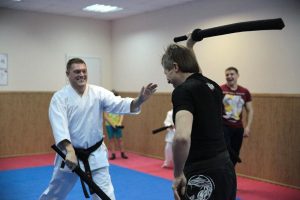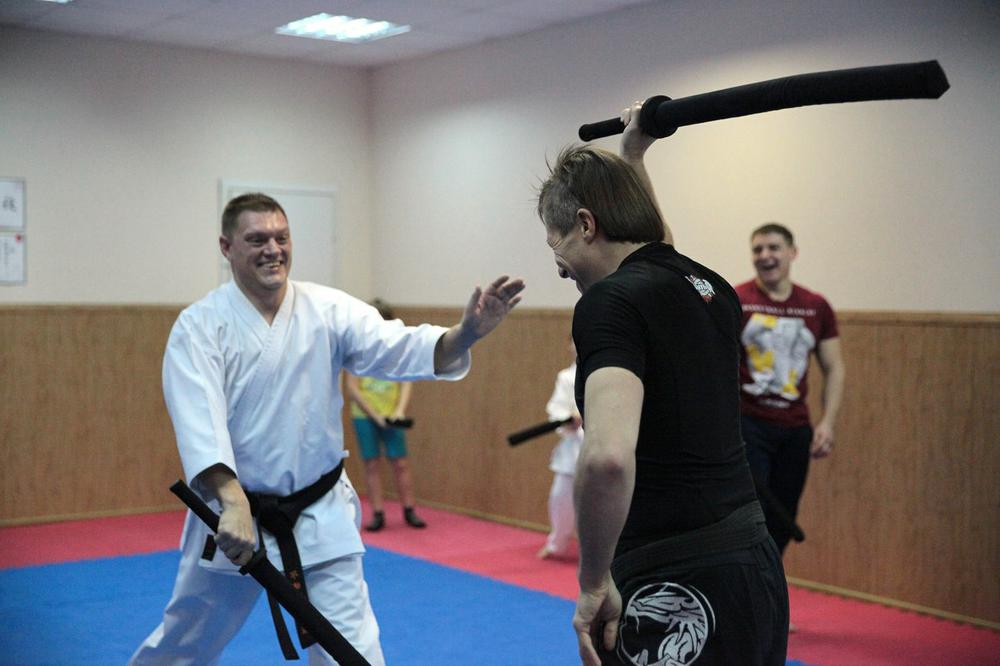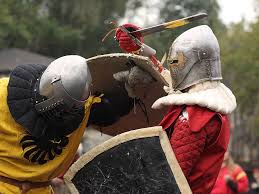Fencing for Seniors at Katana Club
 In adulthood, an active healthy lifestyle is more important than ever. Regular physical activity in the elderly will not only maintain the flexibility of the joints, allow you to remain independent for longer and slow down the signs of old age, but will help increase energy, cope with some symptoms of the disease and prevent the appearance of fencing for the elderly – chanbara pain.
In adulthood, an active healthy lifestyle is more important than ever. Regular physical activity in the elderly will not only maintain the flexibility of the joints, allow you to remain independent for longer and slow down the signs of old age, but will help increase energy, cope with some symptoms of the disease and prevent the appearance of fencing for the elderly – chanbara pain.
In addition to the benefits for the body, fencing also helps to maintain sharpness of mind, reaction, memory and good mood. Physical activity when fencing with canbar, katana, sporting weapons is your ticket to a healthy old age. The Japanese conducted a study and found that, according to statistics, those who practice exercises with the katana sword live 10 years longer and look 10 to 15 years younger than those who do not.
If you have health problems, such as reduced mobility, weight problems, injuries, or diabetes, then you should, of course, be more careful when doing fencing exercises with any blade. However, this is not a reason to put an end to fencing classes.
fencing for the elderly tameshigiri Certified Katana Club fencing trainers will surely help you choose the type of fencing to suit your special needs.
You can engage in fencing at any age! For example, Movshovich AD, honored trainer of Russia, doctor of pedagogical sciences, professor of the department of theory and methodology of martial arts RSUFK (GTsOLIFK), head of the artistic fencing studio “Espada”, vice president of the Russian Federation of artistic fencing, head coach of the Russian national team in art fencing, a teacher of stage fencing at the Higher Theater School. M.S. Shchepkina, actively engaged in fencing in his 75 years.
So age is not a problem for fencing.
Difficulties in fencing after 60
Of course, age must be taken into account and sensitively listen to your health. For example, you may have difficulty maintaining regular physical activity or the likelihood of a breakdown.
Or you may feel insecure due to illness, injury, or fear of injury.
Either you will feel uncomfortable among those younger than you, or much younger.
A person unfamiliar with fencing may just be unclear where to start practicing and how best to do it.
In the end, you may already consider yourself too old and fragile to practice katana or chanbara, to think that the physical fencing for the elderly sparring exercises necessary for practicing fencing is not created for you.
Despite the fact that all this may seem like serious reasons for refusing training, in fact age is not a reason to stop living an active life in all its aspects, including fencing. You can choose for yourself a type of fencing that does not require excessive tension from you. On the contrary, the rational maintenance of motor activity in the elderly is a necessary condition for longevity and better health.
Myths about fencing for the elderly
Most older people who decide to increase their physical activity, starting to engage in fencing, are faced with standard misconceptions that prevent them from implementing their plan:
The myth of the inevitability of sickly old age.
“There is no point in fencing for the elderly, because I’ll get old anyway, I can neither learn nor do anything.”
It is fencing, including Japanese fencing with canbara, katana, that will help you delay weakness and avoid troubles such as diabetes, colon cancer, hypertension, senile obesity, etc. fencing for the elderly
The myth of the need for rest in old age.
“You need to save strength and relax more.”
Modern research proves that a sedentary lifestyle is especially harmful for people older than 50 years and every year the effect of inactivity on the body is increasingly harmful. It is inaction that often causes older people to lose the ability to do many things on their own. Healthy workloads, such as practicing with a chanbara or katana, will significantly reduce the likelihood of hospitalization and the use of drugs, which will also extend your life.
The myth of body fragility.
“Fencing, I can fall.”
In fact, it is physical activity when working with the blade that helps prevent bone loss and improves the balance and speed of the reaction, actually reducing the risk of falling and getting injured.
The myth of lost time.
“It’s too late. That would be 10 years ago … ”
You simply cannot be too old for a healthy lifestyle. If you’ve never done anything like this before, start with slow swords or other fencing for the elderly warm-up exercises. It is logical that you will never be able to ride on the fencing track in the way Olympic champions do it. But you don’t need this.




